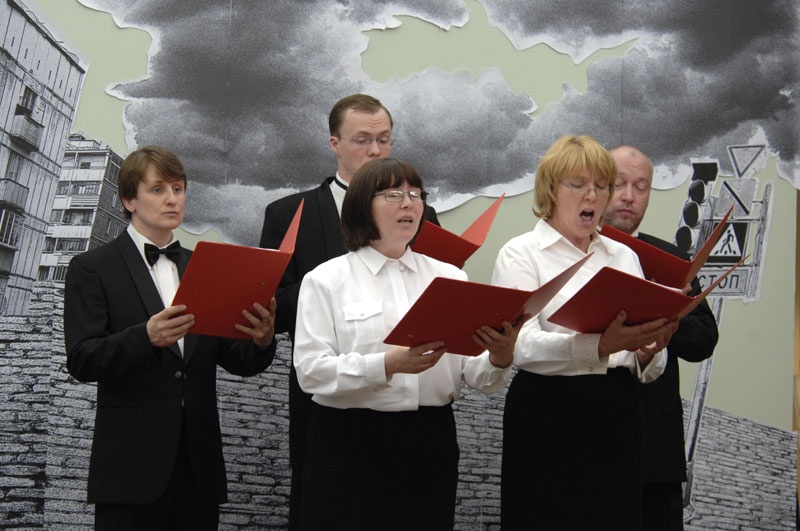Songspiel Triptych + Q&A
16 Oct 2010
The ICA is pleased to present a screening of the entire Songspiel Triptych: Perestroika-Songspiel. The Victory over the Coup, 2008, Partisan Songspiel. A Belgrade Story, 2009 and The Tower: A Songspiel, 2010. Following the screening, Chto delat? members Dmitry Vilensky, Nikolay Oleynikov and Olga Egorova will discuss the triptych and their current exhibition at the ICA, The Urgent Need to Struggle.
The ‘songspiels’ take on a mode of musical theatre developed by playwright Bertolt Brecht and composer Kurt Weill in the early twentieth century, presenting political and social concerns through the accessible and often humorous form of song. Perestroika-Songspiel deals with a key episode during Perestroika in the Soviet Union. The action of the film unfolds on 21 August 1991, after the victory over the restorationist coup. On this day of unprecedented popular uplift, it seemed that democracy had won a final victory in the Soviet Union and that the people would be able to build a new, just society. However, as the film unfolds, it shows the difficulties that are encountered when people try to realise a vision of the future together.
Partisan Songspiel deals with the political oppression and forced evictions of the Roma people inhabiting the settlement of Belleville Belgrade by the government of the city on the occasion of the summer Universiade Belgrade 2009. The film simultaneously addresses a more universal political message about the oppressors and the oppressed: in this case, the city government, war profiteers and business tycoons versus groups of disadvantaged people – factory workers, NGO/minority activists, disabled war veterans, and ethnic minorities.
The last film in the triptych, The Tower: A Songspiel looks at the conflict that has developed around the planned Okhta Centre development in St. Petersburg, where the Gazprom corporation intends to house the headquarters of its locally based subsidiaries in a 403-metre-high skyscraper designed by the UK-based architectural firm RMJM. Despite resistance on the part of various groups who believe that construction of the building will have a catastrophic impact on the appearance of the city, Gazprom has so far managed to secure all the necessary permissions and has begun the first phase of construction. The Gazprom tower is promoted by the authorities as a symbol of a new, modernised Russia. The film asks how such symbols are produced and how projects like this can be pushed through, despite the resistance of ordinary citizens.
